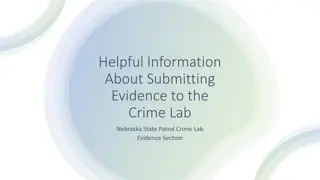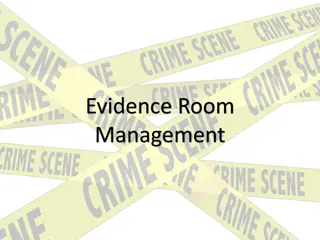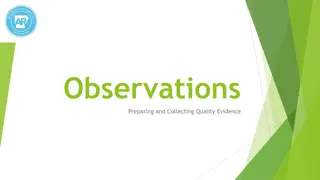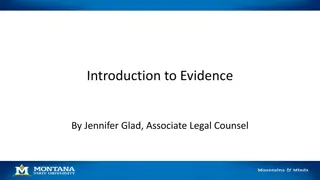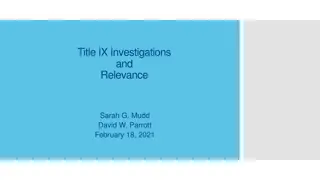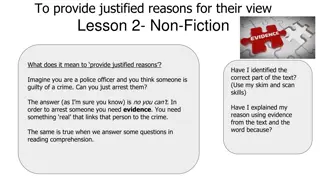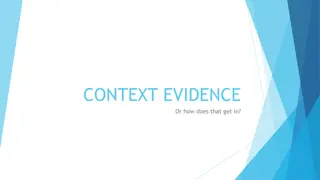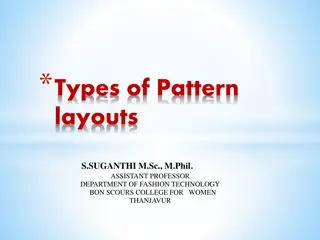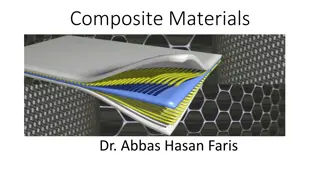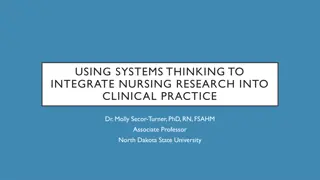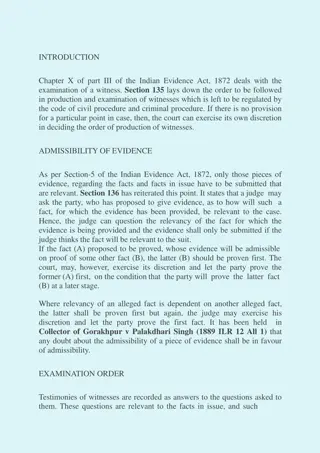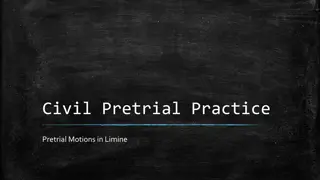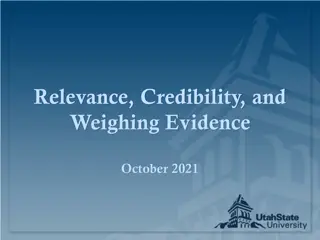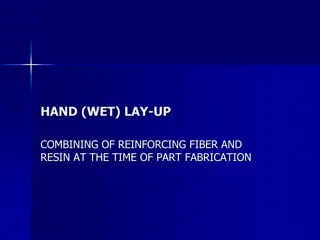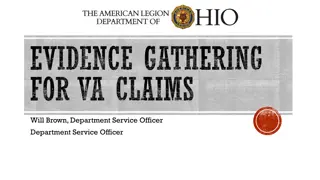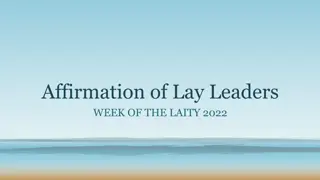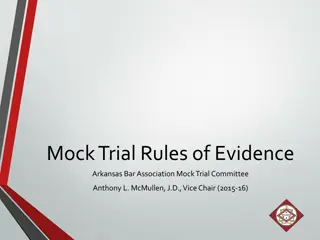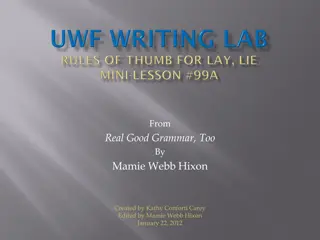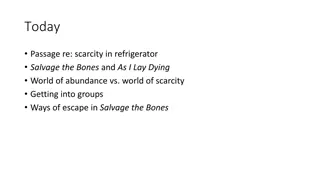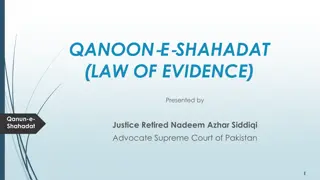The Role of Artifacts and Evidence in Educator Evaluation and Support
Exploring the role of artifacts and evidence in educator evaluation, this content covers the three categories of evidence required by the Oregon Framework. It delves into the efficient process that reduces redundancy, essential components of SLG goals, and the types of evidence relevant to professio
0 views • 15 slides
Understanding Impression Evidence Collection in CSI Investigations
Impression evidence plays a crucial role in investigations, including shoeprints, tool marks, tire tracks, bite marks, and riffling marks on bullets. This evidence can be collected in 2D using photography or tape lifts, and in 3D through casting methods. Differentiating between class and individual
0 views • 21 slides
Helpful Information About Submitting Evidence to the Crime Lab.
Helpful information about submitting evidence to the Nebraska State Patrol Crime Lab's Evidence Section. Learn about the NSP 750 Evidence Submittal Form, submission process, and guidelines for resubmissions. Ensure all necessary details are provided for proper analysis of evidence.
5 views • 16 slides
Illegally obtained evidence
Illegally obtained evidence refers to evidence acquired through unlawful means, such as searches without warrants or extraction under duress. The Fruit of the Poisonous Tree doctrine renders evidence inadmissible if derived from illegally obtained evidence. The Exclusionary Rule prohibits the use of
2 views • 30 slides
Evidence Room Management
Explore the intricacies of evidence room management in a law enforcement setting, including the roles of individuals like Greg Van Buskirk, differences in crime scene management between large and small departments, the distinction between property and evidence, the importance of maintaining chain of
0 views • 8 slides
Enhancing Evidence Collection in Education
Explore the importance of minimizing bias in evidence collection, review different types of evidence, identify strategies to collect quality evidence effectively, understand common biases affecting assessment, and learn to spot and address biased statements. Practice eliminating biased language and
0 views • 11 slides
Understanding Evidence in Investigations
Learn about the principles and types of evidence in investigations, including inculpatory and exculpatory evidence, physical, documentary, demonstrative, and verbal evidence. Explore sources of evidence and the significance of collecting relevant information to ensure a fair investigative process.
0 views • 14 slides
Understanding Title IX Investigations and the Role of Evidence Collection
The purpose of a Title IX investigation is to collect relevant evidence, both inculpatory and exculpatory, to allow for impartial decision-making regarding reported sexual harassment cases. Parties involved must receive sufficient notice and have opportunities to participate, present statements, and
1 views • 32 slides
Providing Justified Reasons in Reading Comprehension
Providing justified reasons in reading comprehension involves using evidence from the text to support one's answer, similar to presenting evidence in a legal case. Just as a police officer needs evidence to make an arrest, readers need textual evidence and the word "because" to support their respons
0 views • 11 slides
Understanding Context Evidence in Legal Proceedings
Context evidence in legal proceedings refers to evidence of acts not charged in the indictment, used to provide a background for understanding specific allegations. This type of evidence is often relied upon by the prosecution to explain events or behaviors that may seem isolated or surprising. It i
1 views • 13 slides
Understanding Lay Planning for Efficient Fabric Cutting in Fashion Design
Lay planning is a crucial process in the fashion industry that involves arranging cutting rooms, table spaces, and labor efficiently to optimize fabric spreading and cutting schedules. By effectively managing these resources, production costs can be reduced, fabric wastage minimized, and cutting pro
1 views • 11 slides
Understanding Thermoset Composite Manufacturing Processes
Composite materials play a significant role in various industries, with thermoset composites dominating the market. The manufacturing processes for thermoset composites, such as hand lay-up and prepreg lay-up, are crucial in creating products like wind turbine blades and aerospace components. The ha
6 views • 23 slides
Integrating Nursing Research into Clinical Practice with Systems Thinking
Dr. Molly Secor-Turner emphasizes the importance of evidence-based practice (EBP) in nursing. EBP, derived from rigorous research, leads to quality patient outcomes by aligning services with current knowledge. The process involves identifying problems, critiquing evidence, implementing recommendatio
0 views • 21 slides
Examination of Witnesses under Indian Evidence Act, 1872
Chapter X of Part III of the Indian Evidence Act, 1872, outlines the process of examining witnesses, including the order of production and admissibility of evidence. Sections 135 to 141 delve into the rules governing the examination-in-chief, cross-examination, and re-examination of witnesses, empha
2 views • 8 slides
Understanding Pretrial Motions in Limine in Civil Pretrial Practice
Pretrial motions in limine (MIL) play a crucial role in civil pretrial practice by seeking evidentiary rulings in advance to control the introduction of evidence at trial. These motions aim to prevent the admission of irrelevant, inadmissible, or prejudicial evidence and can also facilitate the intr
2 views • 17 slides
Understanding the Child Sexual Assault Evidence Scheme
The Child Sexual Assault Evidence Scheme is a significant initiative that facilitates child sexual assault trials by introducing witness intermediaries and pre-recording of children's evidence. It applies to prescribed sexual offences and mandates specific provisions for hearings and evidence presen
1 views • 16 slides
Empowering Health Decisions and Care through OHDSI Community Collaboration
OHDSI's mission revolves around improving health by empowering a community to generate evidence that enhances health decisions and care. The journey to real-world evidence involves leveraging patient-level data in source systems and establishing reliable evidence. The OHDSI community is dedicated to
0 views • 5 slides
Understanding Evidence-Based Medicine and Clinical Decision-Making
European Patients Academy on Therapeutic Innovation emphasizes the importance of Evidence-Based Medicine (EBM) in providing optimum clinical care. EBM involves systematic review and utilization of clinical research for informed decision-making, benefiting patients in disease management and treatment
7 views • 20 slides
Veterans Affairs Compensation and Service Connection Guidelines
The Fall 2020 Professional Training Conference featured presenters discussing important aspects of compensation claims for veterans under U.S.C. 5103A and 38 CFR regulations. The guidelines emphasize the consideration of medical and lay evidence in determining the necessity of medical examinations a
0 views • 30 slides
Understanding Relevance, Credibility, and Weighing Evidence in Decision-Making
Explore the importance of relevance and credibility in evidence assessment, the role of hearing panels in evaluating evidence fairly, and the responsibilities they hold. Learn about presenting relevant evidence, policy analysis, and identifying irrelevant evidence to ensure a thorough review process
6 views • 32 slides
Understanding Verb Forms: Lie/Lay, Sit/Set, Rise/Raise
Learn about the correct usage of transitive and intransitive verbs with examples of common verb pairs like lie/lay, sit/set, and rise/raise. Understand the distinctions between these verb forms to improve your grammar skills and communication accuracy. Enhance your knowledge through this detailed le
0 views • 4 slides
Equipping & Caring for Lay Pastor Ministry - Sailing the 7Cs of Congregational Care
This resource focuses on equipping the saints for the lay pastors' ministry through the 7Cs of Congregational Care, emphasizing the importance of shepherding God's flock with care, prayer, availability, contact, and leading by example. It covers the responsibilities of ministry leaders, the role of
0 views • 15 slides
Mastering Claims, Evidence, and Warrants for Persuasive Writing
Understanding the concepts of claims, evidence, and warrants is crucial for constructing persuasive arguments. Claims represent positions to persuade, evidence supports claims with facts, and warrants bridge the gap between evidence and claims. An exercise is outlined to help practice forming claims
0 views • 8 slides
Understanding the Hand Wet Lay-Up Process in Composite Fabrication
Hand wet lay-up involves combining reinforcing fibers like E-glass, S-glass, Aramid, or Carbon/Graphite with resins such as polyesters, vinyl esters, or epoxies during part fabrication. The process includes preparing molds/tools, applying mold release agents, starting with a gel coat, cutting fabric
0 views • 23 slides
Understanding Biased Assimilation and Attitude Polarization in Social Disputes
People with strong opinions on complex social issues tend to interpret evidence in a biased manner, accepting confirming evidence readily while subjecting disconfirming evidence to critical evaluation. This can lead to increased polarization rather than narrowing of disagreement when exposed to the
0 views • 20 slides
Transformation of Quality Assessment Framework in Healthcare
The healthcare quality assessment framework is evolving with a new strategy focused on data-led, people's experiences, care integration, and safety culture. The current framework is transitioning towards a new approach by late 2023, incorporating separate registration and monitoring processes, five
0 views • 14 slides
Effect of Shooting Angle on Lay-Up Shoot Results in Basketball Games Study
Understanding the impact of shooting angles on lay-up shoot results in basketball games is crucial for players' performance. Researchers conducted a study to investigate the outcomes of lay-up shoots at various angles on both the right and left sides of the court. The research involved observation a
0 views • 10 slides
Understanding the Basics of Mock Trials in the American Justice System
Mock trials in the American justice system involve presenting evidence through witness testimony and physical evidence to help juries or judges determine facts. The process includes witness testimony under oath, examination by attorneys, admission of physical evidence, and closing arguments. The tri
0 views • 38 slides
Understanding Circumstantial Evidence in Legal Proceedings
Circumstantial evidence plays a crucial role in legal proceedings, allowing one to infer facts based on surrounding circumstances rather than direct proof. This type of evidence can be powerful in establishing the guilt or innocence of a person accused of a crime, complementing direct evidence for a
0 views • 39 slides
Understanding Evidence Gathering for VA Claims with The American Legion Department of Ohio
Evidence is crucial for VA claims, and it can come in various forms such as documents, written statements, photos, and video recordings. The framework for evaluating evidence includes factors like relevance, competence, credibility, and weight. Understanding the types of evidence, forms of relevance
0 views • 14 slides
Affirmation of Lay Leaders - Week of the Laity 2022
A worship service celebrating and affirming lay leaders within the church, emphasizing qualities like commitment, humility, and compassion. The service includes a call to worship, affirmation from the congregation, a commitment from lay leaders, and gratitude expressed towards them. The congregation
0 views • 8 slides
Understanding Mock Trial Rules of Evidence
Mock Trial Rules of Evidence are crucial for determining the admissibility of testimony and evidence in a trial setting. Students preparing for cases need to assess evidence admissibility, make timely objections, and be prepared to defend testimony. The rules cover objections, specific objections ty
0 views • 36 slides
Understanding the Difference Between Lay and Lie Verbs in English Grammar
Learn the distinction between the transitive verb "lay" and the intransitive verb "lie" in English grammar, along with their principal parts and usage examples. Avoid confusion by understanding when to use "lay" and "lie" correctly in different contexts.
0 views • 21 slides
Understanding Long-Term Lay-Off and Employee Rights
Long-term lay-offs allow employees to terminate their employment without notice, with compensation due after 200 days. Employers must pay compensation immediately upon resignation. Exceptions apply to partial lay-offs and refusal of short-term work. Continuous work during a lay-off, including annual
0 views • 9 slides
Understanding Pension Options During Organizational Changes and Lay-offs
Explore various pension options available when leaving a university job, including considerations for commuted values, future vested pensions, unreduced early retirement, and negotiating retirement dates. Learn about service vs. pensionable service, grow-in rights, bridge benefits, and EI options du
0 views • 9 slides
Practice and Procedure in Judicial Review: Factual Evidence and Interveners
The content provides valuable insights into the practice and procedure regarding factual evidence and interveners in judicial review cases. It covers general rules, recent cases, applications for oral evidence, questioning witnesses, opinion evidence, and the role of interveners. Key points include
0 views • 28 slides
Exploring Scarcity and Abundance in Literary Works like 'Salvage the Bones' and 'As I Lay Dying'
The passage delves into the stark portrayal of scarcity in a refrigerator, drawing comparisons between 'Salvage the Bones' and 'As I Lay Dying'. It highlights the thematic similarities between Ward and William Faulkner's works, emphasizing the use of symbolism like water and maternal figures. The te
0 views • 13 slides
Optimizing Fabric Cutting Efficiency: Lay Planning Methods and Strategies
Lay planning is crucial for managing material, labor, and space in the cutting room. Different methods such as manual lay planning, pantograph scaling, and computerized systems are used to optimize fabric usage. This process involves arranging pattern pieces efficiently on the fabric to minimize was
0 views • 12 slides
WPUMC Town Hall and Charge Conference Summary
The WPUMC Town Hall and Charge Conference held on June 27, 2021, featured various agenda items including Lay Leadership Reports, Heart and Home Updates, Worship and Ministry Updates, Church Council Standing Committees, Church Council Other Officers, Church Council Members at Large, Trustees informat
0 views • 19 slides
Understanding Qanun-e-Shahadat: Law of Evidence in Pakistan
Qanun-e-Shahadat Order 1984 replaced the Evidence Act of 1872 in Pakistan, aiming to align the law of evidence with Islamic principles. This law is crucial for judicial proceedings, governing the admissibility of oral and documentary evidence, primary and secondary evidence, and resolving conflicts
0 views • 22 slides


